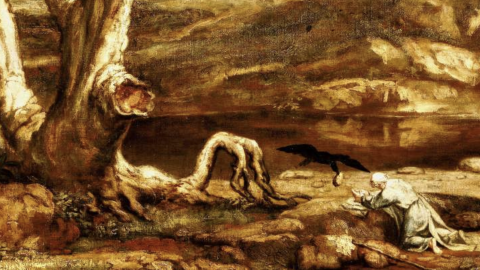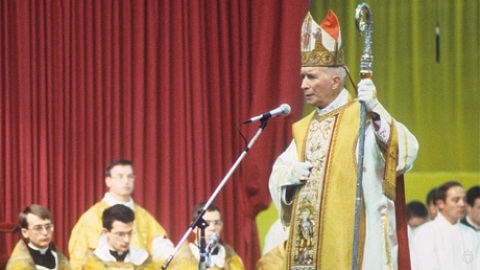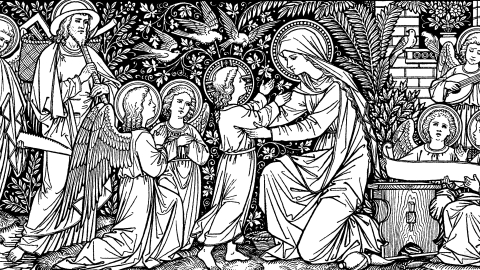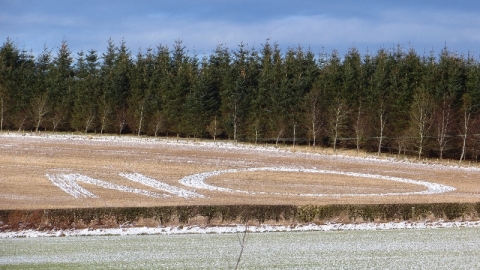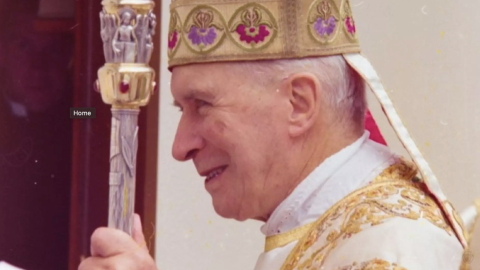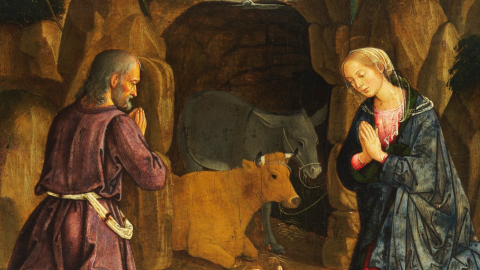Remembrance Sunday - Fr. Willie Doyle sj
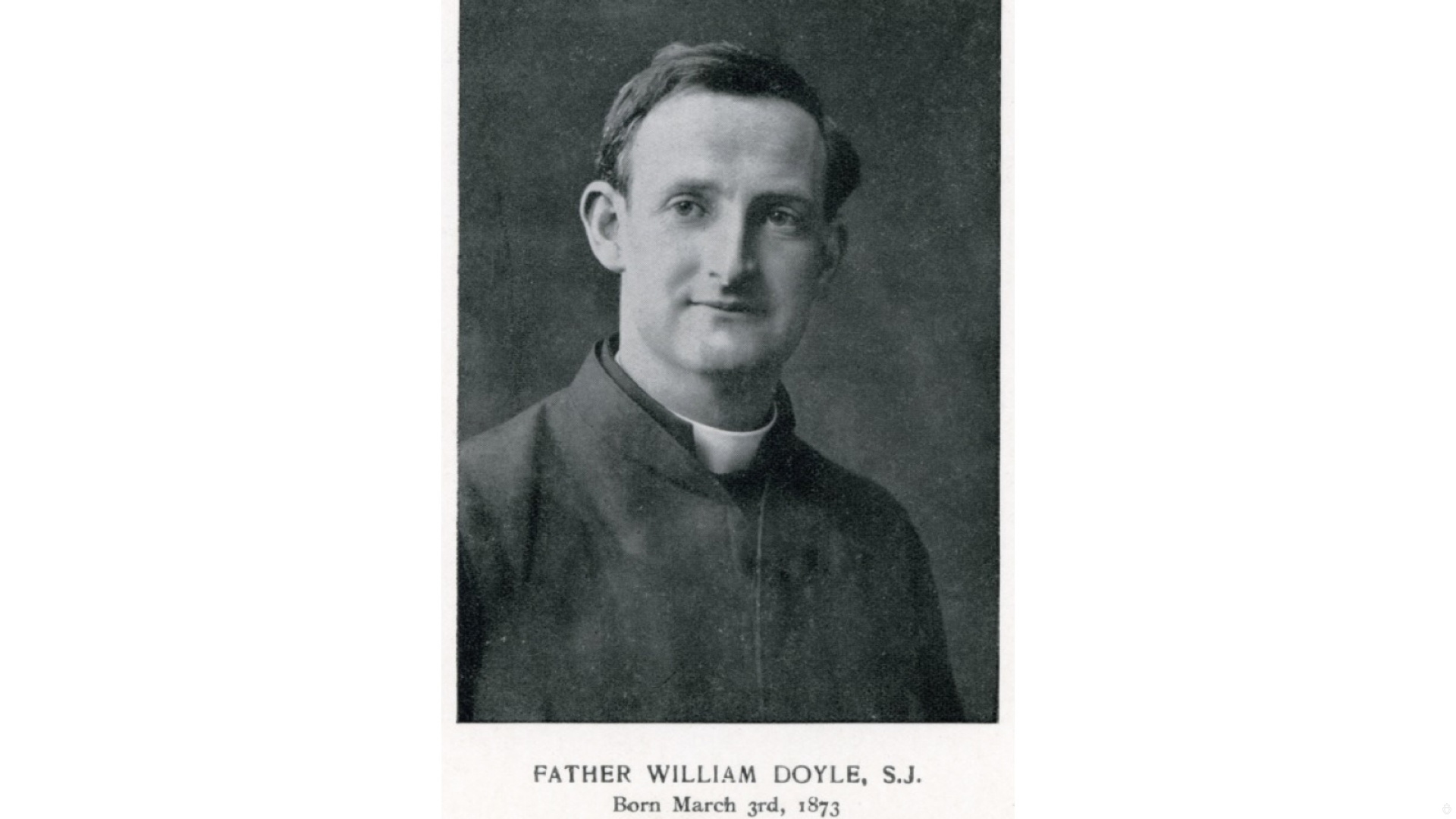
Fr.William Doyle sj
Dies irae, dies illa, Solvet saeclum in favilla
+
War is terrible
My dear brethren, we have just heard these words, the first two lines of the sequence of the Mass:
Day of anger, this day, the heavens dissolve into ashes as prophesied by David and Sybil.
War, my dear brethren is a source of fascination to man. To the atheist, it is proof that God does not exist, the Protestant it is a source of confusion, to the Catholic it is a punishment for the sins of nations and it is an evil permitted by God for a greater good.
So often when we recall the last two World Wars, we dwell on the tragedy of death and suffering with which man afflicted himself. In this sermon, as a Catholic, I shall like to dwell briefly on the good that God brings out of the evil by recounting the life and death of one man on the Western Front. That man is Fr. William Doyle.
Childhood
William Doyle was born the seventh and youngest child of Mr. Hugh Doyle, an official of the High Court of Justice in Ireland, on 3rd March 1873. He was a weak and frail child but blessed with a winning disposition and a desire to help those in need around him. He would save his pocket money to buy tea for the poor, he would secretly wash up, polish shoes and light fires when the cook or the maid was overwhelmed, he even spontaneously whitewashed an old lady’s house from top to bottom when he saw it was desperately in need of attention.
William Doyle was not a prim, stilted ‘goody goody’ sort or boy. He had wonderful freshness and spontaneity. “ Don’t take yourself too seriously,” he once said to a rather dower would-be saint; “ a sense of humour is one of the greatest aids to sanctity.”
Vocation
He finished his school at Ratcliffe College in Leicestershire, very popular and a great sportsman, despite his fragile health, and then returned to his home Melrose, Co. Dublin to contemplate his future. He always knew, and everyone around knew that he would be a priest one day but the question was: was it going to be a secular priest or religious?
“Did you ever think of the religious life?” asked his brother who was then in the Novitiate of the Irish Province of the Society of Jesus. “Never!” was the emphatic reply. But, after an animated discussion his brother made him accept a copy of St. Alphonsus Liguori’s work on the Religious State with a promise to read it and think it over. Later William Doyle recounts:
“On Christmas Day I was alone in the drawing room when Father came in and asked me if I had yet made up my mind as to my future career. I answered ‘Yes’ – that I intended to become a Jesuit. I remember how I played my joy and happiness into the piano after thus giving myself openly to Jesus.”
And this William Doyle proceeded to do all his life, but it was not easy. He fought and struggled against his passions, embraced mortification, both trivial and painful, and grew ever in love with His Redeemer, in love as a person and not some abstract entity, and also with His Blessed Mother.
In his second year of novitiate he suffered a complete nervous breakdown and, but for the support of the Father Provincial of the Jesuits who saw in William a future saint, would have been declared unfit for the religious life.
His family was devout; the eldest entered seminary in Rome, but tragically died of fever a few days before his ordination. The brother closest to him became a Jesuit and his elder sister became a nun. It was no surprise, therefore, that William Doyle entered the Irish Novitiate of the Society of Jesus in 1891. Around the time he made his three vows of religion in 1893 he addressed a note to the Blessed Virgin Mary :
AMDG ac BVM
My Martyrdom for Mary’s Sake.
“Darling Mother Mary, in preparation for the glorious martyrdom which I feel assured thou art going to obtain for me, I, thy most unworthy child, on this first day of thy month, solemnly commence my life of slow martyrdom by earnest hard work and self-denial. With my blood I promise thee to keep this resolution, do thou, sweet Mother, assist me and obtain for me the one favour I wish and long for: To die a Jesuit Martyr. 1st May 1893. May God’s will, not mine, be done! Amen”
Priest
William Doyle was ordained a priest on 28th July 1907 and plunged himself into his apostolate of preaching missions. Altogether between 1908 and 1915 he preached 152 missions and retreats. He had many of the natural gifts which make a successful missioner: an impressive appearance, a clear vibrant voice, considerable fluency, great earnestness, painstaking preparation and indomitable energy. His breadth of view and patient sympathy made him an ideal confessor, and during missions his confessional was always besieged.
Chaplain
At the outbreak of war in 1914, Fr. Doyle wrote in an intimate letter to his mother: “What I am going to tell you now may pain you, I have volunteered for the Front as a Military Chaplain, though perhaps I may never be sent. Naturally I have little attraction for the hardship and the suffering the life would mean; but it is a glorious chance of making the ‘ould body’ bear something for Christ’s dear sake. However, what decided me in the end was a thought that flashed into my mind when in the chapel: the thought that if I get killed I shall die a martyr of charity and so the longing of my heart will be satisfied.”
Fr. Doyle was sent to the Front after military training on 17th February 1916 as chaplain in the 8th Royal Irish Fusiliers and saw action at Loos, The Somme and finally at Ypres.
Needless to say, the conditions were of a horror never imagined before in history as this account of his journey to the front on the Somme battlefield illustrates:
Horror of War
" The first part of our journey lay through a narrow trench, the floor of which consisted of deep thick mud, and the bodies of dead men trodden under foot. It was horrible beyond description, but there was no help for it, and on the half-rotten corpses of our own brave men we marched in silence, everyone busy with his own thoughts. I shall spare you gruesome details, but you can picture one's sensations as one felt the ground yield under one's foot, and one sank down through the body of some poor fellow.
"Half an hour of this brought us out on the open into the middle of the battlefield of some days previous. The wounded, at least I hope so, had all been removed, but the dead lay there stiff and stark, with open staring eyes, just as they had fallen. Good God, such a sight! I had tried to prepare myself for this, but all I had read or pictured gave me little idea of the reality. Some lay as if they were sleeping quietly, others-had died in agony, or had had the life crushed out of them by mortal fear, while the whole ground, every foot of it, was littered with heads or limbs, or pieces of torn human bodies. In the bottom of one hole lay a British and a German soldier, locked in a deadly embrace, neither had any weapon, but they had fought on to the bitter end. Another couple seemed to have realised that the horrible struggle was none of their making, and that they were both children of the same God ; they had died hand-in-hand praying for and forgiving one another, A third face caught my eye, a tall, strikingly handsome young German, not more, I should say, than eighteen. He lay there calm and peaceful, with a smile of happiness on his face, as if he had had a glimpse of Heaven before he died. Ah, if only his poor mother could have seen her boy it would have soothed the pain of her broken heart.
Mission
But God had brought Fr. Doyle here for a reason: to snatch souls for eternity from the clutches of the real enemy. There are so many stories of his heroism at the front in succour of souls that here I can simply read a few. Here is an account given by Fr. Doyle following a gas attack at Loos:
"By -the time I got down to the dressing station the guns had ceased fire, the gas blown away, and the sun was shining in a cloudless sky. Already a stream of wounded was coming in and I soon had my hands full, when an urgent message reached me from the front trench. A poor fellow had been desperately wounded; a bullet had cut him like a knife across the stomach, with results you can best imagine. He was told he had only a few minutes to live, and asked if they could do anything for him. 'I have only one wish before I die,' he answered, ' could you possibly get me Fr. Doyle ? I'll go happy then.' It was hard work to reach him, as parts of the communication trench were knee deep in water and thick mud. Then I was misdirected and sent in the wrong direction, but I kept on praying I might be in time, and at last found the dying man still breathing and conscious. The look of joy, which lit up his face when I knelt beside him, was reward enough for the effort I had made. I gave him Absolution and anointed him before he died, but occupied as I was I did not notice that a third gas attack had begun.
Fr. Doyle inhaled some of the chlorine gas but only enough to lay him low for a day or so.
And then at the Somme he give this account:
" I was standing about 100 yards away watching a party of my men crossing the valley, when I saw the earth under their feet open and the twenty men disappear in a cloud of smoke, while a column of stones and clay was shot a couple of hundred feet into the air. A big German shell by the merest chance had landed in the middle of the party. I rushed down the slope, getting a most unmerciful 'whack’ between the shoulders, probably from a falling stone as it did not wound me, but it was no time to think of one's safety. I gave them all a General Absolution, scraped the clay from the faces of a couple of buried men who were not wounded, and then anointed as many of the poor lads as I could reach. Two of them had no faces to anoint and others were ten feet under the clay, but a few were living still.
And at Ypres:
“A few nights ago, I had been along the front line as usual to give the men a General Absolution which they are almost as anxious to receive for the comfort it will be for their friends at home, should they fall, as for themselves. I was coming down to the advanced dressing station, when I learned that a small party had ' gone over the top ' on our right, though I had been told the raid was only from the left. When I got to the spot I found they had all gone and were lying well out in No Man's Land. It was a case of Mahomet and the mountain once more. The poor ' mountain’ could not come back, though they were just longing to, but the prophet could go out, could he not? So Mahomet rolled over the top of the sandbags into a friendly shell hole, and started to crawl on his hands and knees and stomach towards the German trenches. Mahomet, being only a prophet, was allowed to use bad language, of which privilege he availed himself, so report goes, to the full, for the ground was covered with bits of broken barbed wire, shell splinters, nettles, etc., etc., and the poor prophet on his penitential pilgrimage left behind him much honest sweat and not a few drops of blood.
"That was a strange scene!” he recalls. “A group of men lying on their faces, waiting for certain death to come to some of them, whispering a fervent act of contrition, and God's priest, feeling mighty uncomfortable and wishing he were safely in bed a thousand miles away, raising his hand in Absolution over the prostrate figures. One boy, some little distance off, thinking the Absolution had not reached him, knelt bolt upright, and made an act of contrition you could have heard in Berlin, nearly giving the whole show away and drawing the enemy's fire.
To comfort his father he wrote:
"There was really little danger, as shell holes were plentiful, but not a little consolation when I buried the dead next day to think that none of them had died without Absolution. I was more afraid getting back into our own trenches; for sentries, seeing a man coming from the direction of No Man's Land, do not bother much about asking questions and object to nocturnal visitors."
Putting his life at risk to offer Mass
William Doyle found much strength and consolation from being able to offer the Holy Sacrifice. Usually it was in a dugout or a shelter. Here is one account:
"By cutting a piece out of the side of the trench," he says, "I was just able to stand in front of my tiny altar, a biscuit box supported on two German bayonets. God's angels, no doubt, were hovering overhead, but so were the shells, hundreds of them, and I was a little afraid that when the earth shook with the crash of the guns, the chalice might be overturned. Round about me on every side was the biggest congregation I ever had : behind the altar, on either side, and in front, row after row, sometimes crowding one upon the other, but all quiet and silent, as if they were straining their ears to catch every syllable of that tremendous act of Sacrifice—but every man was dead! Some had lain there for a week and were foul and horrible to look at, with faces black and green. Others had only just fallen, and seemed rather sleeping than dead, but there they lay, for none had time to bury them, brave fellows, every one, friend and foe alike, while I held in my unworthy hands the God of Battles, their Creator and their Judge, and prayed Him to give rest to their souls. Surely that Mass for the Dead, in the midst of, and surrounded by the dead, was an experience not easily to be forgotten."
Purification
Fr. Doyle was not swept along by the incessant activity involved in ministering to his men. He saw, in the trials of war, the Divine Plan for himself. To Fr. Doyle the trenches were a place to prepare the ultimate sacrifice by purification. He received an MC at the Somme but…
Fr. Doyle's interests and happiness lay elsewhere. "They have given me the M.C.," he said, "but His crosses are far more welcome." "I wonder," he wrote on 7th November, "I wonder is there a happier man in France than I am. Just now Jesus is giving me great joy in tribulation, though conditions of living are about as uncomfortable as even S. Teresa could wish-—perpetual rain, oceans of mud, damp, cold and a plague of rats. Yet I feel that all this is a preparation for the future and that God is labouring in my soul for ends I do not clearly see as yet. Sometimes I kneel down with outstretched arms and pray God, if it is a part of His divine plan, to rain down fresh privations and sufferings." "But," he adds with a characteristic touch of whimsical humour, "I stopped when the mud wall of my little hut fell in upon me—that was too much of a good joke!"
Near death experiences
On so many occasions Fr. Doyle escaped death, so much so that his dugout was a refuge for as many men as it could hold during barrages for his men thought that he was protected by God. He had shells burst all around him on numerous occasions, one literally one pace away, but as always survived largely unscathed. When his work was done, however, he was eventually called to his reward on 16th August 1917 at Ypres.
Death
The Daily Telegraph reported:
"All through the worst hours an Irish padre went about among the dead arid dying giving Absolution to his boys. Once he came back to head quarters, but he would not take a bite of food or stay, though his friends urged him. He went back to the field to minister to those who were glad to see him bending over them in their last agony. Four men were killed by shell fire as he knelt beside them, and he was not touched—not touched until his own turn came. A shell burst close by, and the padre fell dead."
(Philip Gibbs in the Daily Chronicle and the Daily Telegraph ; also in his book From Bapaume to Passchendaele, 1917, p. 254.)
Letter to us all
While solicitous for his flock when under his charge, Fr. Doyle was not unmindful of them when dead. The following letter, which appeared in the Irish Catholic for 26th May, 1917, was written by Fr. Doyle and is a fitting conclusion to this sermon on Remembrance Sunday where, having heard of the good wrought in the souls of Fr. Doyle and his men, we too may bring good our of such an evil which is war:
"Dear Sir—One is often struck, on glancing over the papers, at the numerous appeals made to provide 'comforts for our troops,' but no one ever seems to think that the souls of those who have fallen in battle may possibly be in need of much greater comfort than the bodies of their comrades who survive.
"With all the spiritual help now at their disposal, even in the very firing line, we may be fairly confident that few, if any, of our Catholic men are unprepared to meet Almighty God. That does not mean they are fit for Heaven. God's justice must be fully satisfied, and the debt of forgiven sin fully atoned for in Purgatory. Hence I venture to appeal to the great charity of your readers to provide 'comforts for our dead soldiers' by having Masses offered for their souls. Remembrance of our dead and gratitude are virtues dear to every Irish heart. Our brave lads have suffered and fought and died for us. They have nobly given their lives for God and country. It is now our turn to make some slight sacrifice, so that they may soon enter into the joy of eternal rest.”
My dear brethren, let us make this slight sacrifice now by offering our prayers for these men, through the BVM during this Holy Sacrifice of the Mass.
+
